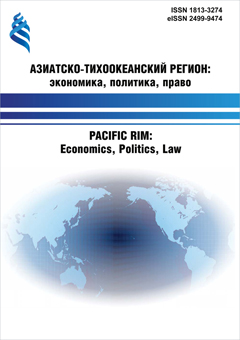Functions of public administration of higher education in the Asia-Pacific countries (comparative legal research)
DOI:
https://doi.org/10.24866/1813-3274/2025-3/103-117Keywords:
Asia-Pacific region, government functions, public administration, government agencies, higher education, Ministry of Education, education law, licensing, accreditation, control, supervisionAbstract
The article provides a comparative legal analysis of the features of the implementation of the functions of public administration of higher education in a number of countries in the Asia-Pacific region with a large network of higher education institutions: Australia, Vietnam, Indonesia, China, Malaysia, Myanmar, Thailand, the Philippines, South Korea, Japan. The task is solved to identify the general principles of building a system of state functions in the field of higher education, which can be used to improve the system of Russian public administration of higher education. The paper describes the model and structure of the higher education management system in these countries. The lists of state functions in the field of higher education in each country are analyzed, and similar functions inherent in practically all central state bodies of higher education management are identified. It is emphasized that the model of the system of powers of various higher education management bodies in different countries differs depending on the predominance of state or non-state educational organizations implementing higher education programs, which in many countries include not only universities, but also a significant number of colleges, and which are subject to the controlling influence of the central government bodies of higher education. At the same time, there is a tendency to expand the autonomy of educational organizations implementing higher education programs in solving issues of a managerial, personnel, financial and economic nature, which accordingly affects the implementation of state functions by the central bodies of state administration of higher education. Also, in many countries of the Asia-Pacific region, similarities have been revealed with the list of government functions in the field of higher education in our country.
Downloads
References
1. Global data and business intelligence platform «Statista». URL: http://www.statista.com (дата обращения: 10.07.2024).
2. Official website of Department of Education of Australian Government. URL: https://www.education.gov.au (дата обращения: 01.02.2024).
3. Williams G., Pillai S. Commonwealth power over higher education // 30 University of Queensland Law Journal. 2012. № 24. P. 287–303.
4. Official website of Australian Government. URL: https://www.pmc.gov.au/sites/default/files/resource/download/aao-01-june-2022. pdf (дата обращения: 02.02.2024).
5. Tertiary education quality and standards agency Act 2011 № 73 // Federal Register of Legislation of Australian Government. URL: https://www.legislation.gov.au/C2011A00073/2021-07-01/text (дата обращения: 01.02.2024).
6. Trines S. Education in Vietnam // World Education News + Reviews. 2017. № 8. URL: https://wenr.wes.org/2017/11/education-in-vietnam (дата обращения: 14.06.2024).
7. Decree № 69/2017/ND-CP dated May 25, 2017 of the Government on defining the functions, tasks, powers and organizational structure of the Ministry of Education and Training // English Legal Normative Documents LuatVietnam. URL: https://english.luatvietnam.vn/decree-no-69-2017-nd-cp-dated-may-25-2017-of-the-government-on-defining-the-functions-tasks-powers-and-organizational-structure-of-the-ministry-of-114603-doc1.html (дата обращения: 17.06.2024).
8. Decree № 123/2016/ND-CP dated September 01, 2016 of the Government on defining the functions, tasks, powers and organizational structures of ministries and ministerial-level agencies // English Legal Normative Documents LuatVietnam. URL: https://english.luatvietnam.vn/decree-no-123-2016-nd-cp-dated-september-01-2016-of-the-government-on-defining-the-functions-tasks-powers-and-organizational-structures-of-ministr-108179-doc1.html (дата обращения: 17.06.2024).
9. Official website of Ministry of Education and Training of Vietnam. URL: https://en.moet.gov.vn/Pages/home.aspx (дата обращения: 08.02.2024).
10. Westerheijden D.F., Cremonini L., Empel R. Accreditation in Vietnam's Higher Education System // Higher Education Dynamics. 2010. Vol. 29, № 29. P. 183–195.
11. Kementerian Pendidikan, Kebudayaan Riset, dan Teknologi. URL: https://www.kemdikbud.go.id (дата обращения: 27.02.2024).
12. Undang-Undang Republik Indonesia Nomor 20 Tahun 2003 Tentang Sistem Pendidikan Nasional. URL: https://www.banpt.or.id/wp-content/uploads/2019/03/UU-Nomor-20-Thun-2003.pdf (дата обращения: 18.07.2024).
13. Херавати А.Ф. Система образования и высшие учебные заведения в Республике Индонезия // Высшая школа: опыт, проблемы, перспективы: материалы XV Международной научно-практической конференции. Москва, РУДН, 25 июня 2022 г. / науч. ред. В.И. Казаренков. Москва: РУДН, 2022. С. 138–142.
14. Конституция КНР от 04.12.1982. URL: https://chinalaw.center/constitutional_law/china_constitution_revised_2018_russian/ (дата обращения: 19.06.2024).
15. Сун И. Функции контроля и надзора в сфере общего образования Китая (в XXI веке) // Школа будущего. 2023. № 2. С. 160–169.
16. Kementerian Pendidikan Tinggi. URL: https://www.mohe.gov.my/en (дата обращения: 20.06.2024).
17. Malaysian Education Act 1996 № 550. URL: https://planipolis.iiep.unesco.org/sites/default/files/ressources/malaysia_education_act_1996.pdf (дата обращения: 24.06.2024).
18. National council on Higher Education Act 1996 № 546. URL: http://commonlii.org/my/legis/consol_act/ncohea1996328 (дата обращения: 24.06.2024).
19. Жанузакова Л.Т., Кулжабаева Ж.О. Высшее образование в Малайзии // Вестник Института законодательства Республики Казахстан. 2009. № 1(13). С. 182–187.
20. National Education Law of Myanmar 2014 № 41. URL: https://themimu.info/sites/themimu.info/files/documents/National_Education_Law_2014_ENG.pdf (дата обращения: 27.06.2024).
21. Ухалов Д.С. Текущее состояние сферы высшего образования в Мьянме // Известия Восточного института. 2024. № 1. С. 124–133.
22. Official website of Ministry of Education of Thailand. URL: https://www.bic.moe.go.th/images/stories/book/ed-eng-series/intro-ed08.pdf (дата обращения: 28.06.2024).
23. Nitungkorn S. Higher education reform in Thailand // Southeast Asian Studies. 2001. Vol. 38, № 4. P. 461–480.
24. Philippine Republic Act on Creating the Comission on Higher Education, Appropriate Funds therefore and for Other Purposes 1994 № 7722. URL: https://laws.chanrobles.com/republicacts/78_republicacts.php?id=7726 (дата обращения: 31.01.2024).
25. Adeyemo K.S., Sehoole C. Higher education and the challenges of skills production in the Philippines // South African Journal of Higher Education. 2016. Vol. 29, №. 2. P. 23–41. URL: https://www.researchgate.net/publication/319247407_Higher_education_and_the_challenges_of_skills_production_in_the_Philippines/references (дата обращения: 09.07.2024).
26. Terri K. Higher education reforms in South Korea: Public-private problems in iternationalising and incorporating universities // Policy Futures in Education. 2008. Vol. 6, № 5. Pp. 558–568.
27. Official website of Ministry of Education, Culture, Sports, Science and Technology of Japan. URL: https://www.mext.go.jp/en/index.htm (дата обращения: 21.05.2024).
28. Basic Act on Education 2006 № 120 of Japan. URL: https://www.japaneselawtranslation.go.jp/en/laws/view/2442 (дата обращения: 22.05.2024).
29. Дронишинец Н.П. Проблемы управления системой высшего образования в Японии // Университетское управление: практика и анализ. 2002. № 1. С. 70–79.
Downloads
Published
Issue
Section
License
Copyright (c) 2025 Максим Алексеевич Каплюк

This work is licensed under a Creative Commons Attribution-NonCommercial 4.0 International License.


